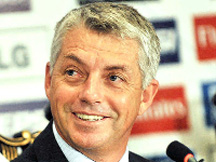NEW DELHI, (Reuters) – An aggrieved Indian cricket board (BCCI) on Wednesday sent a letter to the game’s governing body slamming the “inadequacy” of the Umpire Decision Review System (UDRS) being used in the World Cup.

The world’s richest national cricket body also attacked International Cricket Council (ICC) general manager Dave Richardson’s criticism of India captain Mahendra Singh Dhoni who had questioned the use of the technology during his team’s tied match against England on Sunday.
For the first time at a World Cup, each team has the right to question at least two decisions which go against it during an innings. A “third umpire” uses the technology to determine if the on-field officials were correct.
“The inadequacy of the UDRS has been exposed in the CWC 2011. The group stage match between India and England was a case in point which clearly brought out the inadequacy of the system,” BCCI secretary N Srinivasan wrote in his letter to ICC chief executive Haroon Lorgat, later sent to media at the Cup.
“ICC in consultation with Hawkeye formed playing conditions which specifies when the umpire can rely on Hawkeye and when he cannot. This itself is an admission on the question of reliability of the system including ball tracking technology.”
The debate stemmed from England’s Ian Bell’s apparent let-off on Sunday against India in Bangalore.
Dhoni and his team mates sought a review after umpire Billy Bowden had turned down an lbw appeal against Bell, a decision that was confirmed as third umpire Rodney Tucker referred it back to Bowden.
Bell survived because he had stretched well forward and the rule says if a batsman stretches more than 2.5 metres, he would be ruled not out regardless of the ball’s trajectory. The ball was clearly hitting the stumps.
Even the English batsman admitted later that he thought he was out and was on his way back to the pavilion after seeing footage from Hawkeye on a big screen shown to the crowd. He had scored 17 at the time and went on to make 69.
Dhoni called it “adulteration of technology with human thinking”.
Richardson was subsequently quoted in the Indian media as saying Dhoni would not have criticised UDRS had he been aware of the rule.
The ICC official’s remarks did not go down well with the Indian board which is co-hosting the event with Sri Lanka and Bangladesh.
“BCCI takes strong objection to Mr David Richardson criticising the Indian captain M S Dhoni. Mr. Richardson’s comment that the Indian captain should know the rule is out of place,” Srinivasan wrote.
“The Indian captain only highlighted the inadequacy of the system and rightly so. It was there for the world to see.
“For an ICC representative to criticise a player for his post match press conference while the World Cup is being played is tantamount to pressurising the player. Mr Richardson has no right to do so.
“BCCI has strong reservations about the statement made by Mr Richardson. He should be instructed not to react in this fashion.”
The Indian cricket board remains a steadfast opponent of the UDRS and Srinivasan had earlier told Reuters that BCCI would never allow it to be used in any bilateral series involving India.
The ICC has been trying to convince BCCI and even invited members to watch its application in the Ashes series but the Indian board would not budge from its stance.
The governing body made no immediate comment to the BCCI letter on Wednesday.
The episode follows a dispute last week between the two when an ICC letter was leaked to the media, criticising the BCCI’S handling of ticketing for matches.





